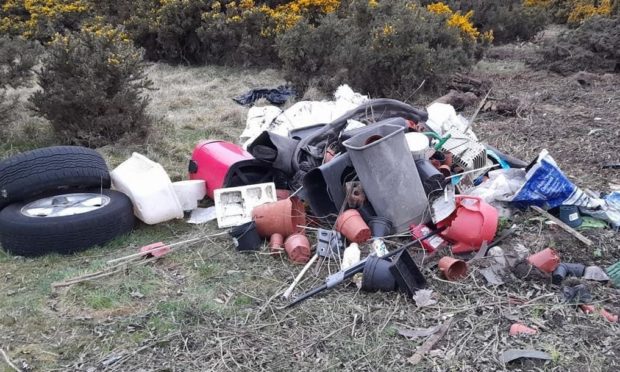The next Scottish Government must back farmers and crofters by sourcing more local produce and introducing tougher penalties for fly-tipping, claims Scottish Land & Estates (SLE).
The landowners’ body made the plea as it launched its manifesto – People, Jobs and Nature – ahead of next month’s Scottish Parliament elections.
Among its demands were the creation of a comprehensive fly-tipping plan, along with tougher penalties for repeat offenders, and more work to teach members of the public about responsible access.
“Ending the scourge of fly-tipping and healing our rural communities is at the heart of SLE’s priorities for the next parliament,” said SLE chief executive, Sarah-Jane Laing.
“In our manifesto – People, Jobs and Nature – we call on all parties to commit to prevent, detect and prosecute fly-tipping offences. With tough sentences for repeat offenders.”
She said incidents of fly-tipping had increased since the start of the Covid-19 pandemic, and farmers and landowners were regularly faced with the costly task of removing waste, which is potentially hazardous, from their land.
“We are pleased, that after representation from SLE and others, the Scottish Government agreed to give equal weight to fly-tipping in its forthcoming litter strategy,” added Ms Laing.
“We will work with the next Government and all parties to protect our rural communities from fly-tipping with tough measures and comprehensive cover, to ensure victims of fly-tipping are no longer out of pocket to clear it up.”
SLE’s other wishes include a plea for Government to use its procurement powers to support Scottish farmers and crofters.
Ms Laing said: “We have to value our high-quality Scottish produce and back farmers after what has been a very difficult period.
“One way to show support is by using public procurement powers to support domestically produced food. This would not only support our farmers but also create a cascade benefit of investment in rural Scotland throughout the supply chain.”
SLE has also called on the next Holyrood Government to take steps to ensure energy efficiency rules, and Energy Performance Certificates (EPCs), do not result in a shortfall in rural homes available for rent.
“Our members provide affordable homes across rural Scotland, they are committed to continue doing so, but current methodology around EPCs is not fit for purpose and the consequences could be very serious,” said Ms Laing.
“Many assessors are not sufficiently trained to understand traditional and rural properties when carrying out reviews. The upgrades they recommend are often not realistic, sustainable, or even environmentally beneficial.”
She said some of the changes proposed from EPC reviews could result in significant increases to rents, and in some cases properties being taken off the rental market.
“There is a real risk that this failure of methodology could lead to less affordable homes being available in rural areas,” added Ms Laing.
The SLE manifesto is online at scottishlandandestates.co.uk

